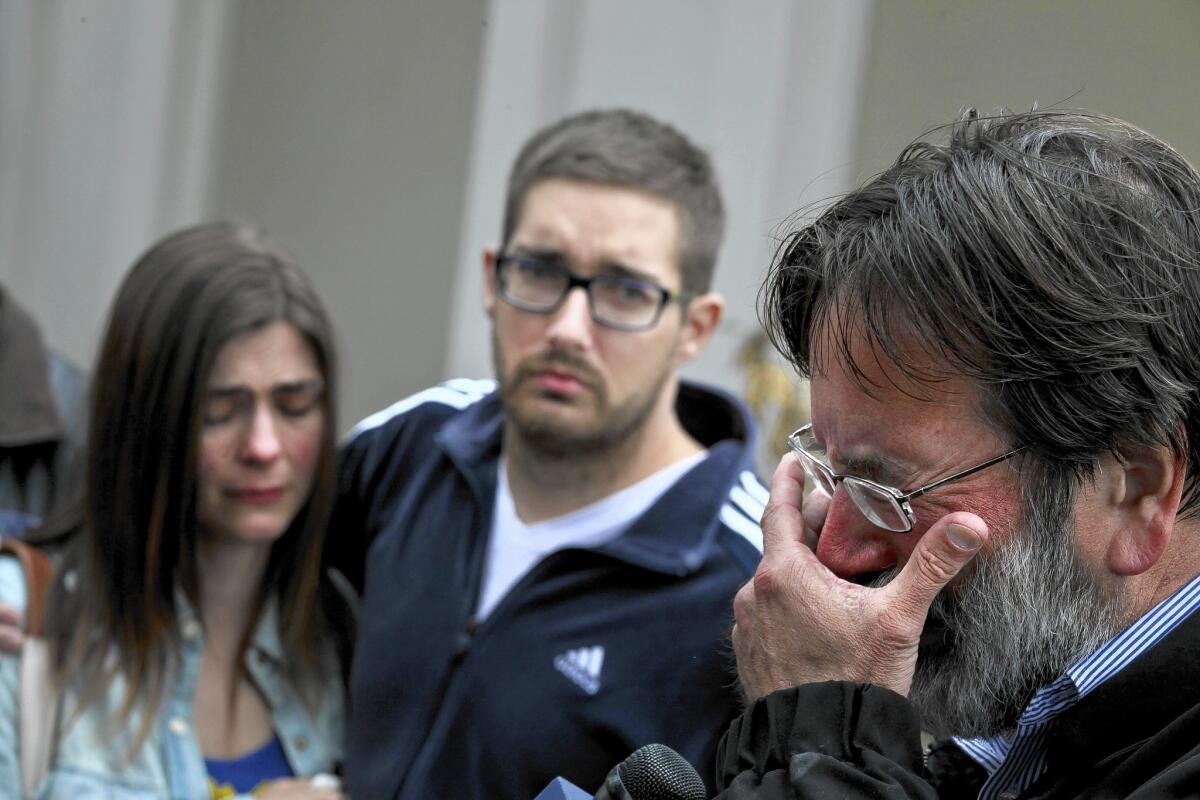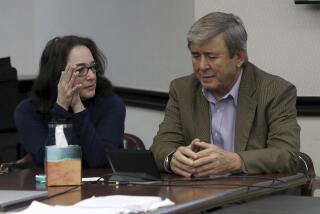Father of Isla Vista victim knows he has to keep speaking out

- Share via
Richard Martinez’s phone doesn’t ring every few minutes as it did in those first days after the killings. The interview requests and condolence calls have slowed. When family and friends gathered for his son’s memorial service, the national media had moved on to new tragedies.
In the nearly four weeks since his 20-year-old son, Christopher Michaels-Martinez, and five other college students were slain in Isla Vista, a gunman killed a college student in Seattle, a man shot a sheriff’s deputy outside a Georgia courthouse, a young couple killed two policemen and a shopper in Las Vegas, and a teenager with a rifle tore through a high school near Portland, killing a fellow student.
“I figure I get a limited amount of time to be in this position,” Martinez said of the post-massacre media swarm. “I know that this story has a life span.”
Martinez isn’t sure what his life will look like now that his son is gone, but he knows it won’t stay the same. He quit his job as a defense attorney and plans to travel across the country meeting with families of other mass shooting victims. Every day he checks in with the same four people: his brother; his childhood best friend, who is a psychologist; and two political consultants. With their guidance, he’s begun to chart a plan. A plan that began with talking to anyone who would listen. A plan to use his pain to shake politicians into action and to spur change that could protect others from feeling the way he does now. Undone.
After the detective’s phone call that Friday night, as Martinez felt his stomach sink and he collected two decades of memories in his mind, he made a decision: He wouldn’t grieve in silence. The tragedy catapulted him into a spotlight he didn’t ask for — but one he plans to take advantage of.
“I’ve got to find some meaning, some way to live with this,” he said. “And this is the only way I know how.”
Once an aide to then-Assemblyman Charles M. Calderon and later a lawyer, Martinez can throw together an argument in a few minutes. So when he heard about the news conference slated for the day after the slayings, he talked to his brother and to Christopher’s mother. He trimmed their thoughts, jotted them down and got ready to crash the afternoon conference called by authorities. After stepping to the lectern, he spelled his last name for reporters and began a 90-second statement that turned to a hoarse yell.
“Chris died because of craven, irresponsible politicians and the NRA,” he said, his cheeks turning red. “When will enough people say, ‘Stop this madness; we don’t have to live like this?’ Too many have died. We should say to ourselves: ‘Not one more.’”
He repeated those three words a few days later in front of tens of thousands of students at the memorial service, and soon they became a battle cry for those seeking stricter gun-control laws and a popular hashtag on social media.
In the week after the rampage, Martinez did back-to-back interviews. The requests kept coming, from Chinese radio stations and CNN, and he kept saying yes. He figured that before long, something else would grab the media’s attention. Something silly, he guessed, like Justin Bieber running over a rabbit. Or something worse. As it turned out, new heartbreak would eclipse the focus on Isla Vista.
He talked about guns in some of the interviews. Other times he talked about Christopher — the little boy who hit so many home runs in Little League that he earned the nickname “Mini Sammy Sosa.” A few days later, wedged between interviews, Martinez received a phone call from an unfamiliar number.
It was Sammy Sosa.
The former major league slugger said he heard about Christopher’s nickname on the news. When he watched Martinez cry, he couldn’t help but think of losing one of his six kids. At the end of their 25-minute conversation, Sosa told Martinez that he planned to donate $5,000 to a memorial fund.
“I was touched,” Sosa said. “I hope Mr. Martinez and the effort he’s doing doesn’t go away for a long time. He’s a fighter.”
Grief can come in messy stages — in bursts of tears in public places, in anger over things that never made you mad before, in learning that some questions won’t give you answers.
For Martinez, the first stage was activism. He admits he’s not an expert on gun laws, but he’s started to do some research. He asked the father of another shooting victim to send him information on pending legislation and he’s begun to scour the NRA’s website.
“I have to know what the other side is thinking,” he said. “I need to know how decisions are made within the organization. I want to know who makes them, where their money comes from, what legislators they’re close to.”
This week, he took his campaign to Washington.
When Martinez paused to analyze his go-go-go approach since the slayings, he admitted it’s partly a distraction from the only thing he thinks about when he’s alone and things are quiet: his son.
“I’m kind of running,” he said, tears streaming onto his white beard. “If I don’t do anything and just sit around and think about this hole in my life, I’m going to die. I’m 60 going on 61 — I’m not going to have another kid.”
It’s in the silence — at night, as he tries to force himself to fall asleep — that he replays their last conversation in his mind. He thinks about the exact green of his son’s eyes and laughs about how he drenched his food in Sriracha. He stares at old pictures of the trip they took to the state Capitol 10 years ago and shudders when he notices that the flag in one picture was flying at half-staff. He runs his thin fingers over another picture of Christopher in his green football jersey, his blondish hair darkened a couple of shades by sweat.
After the massacre, Martinez spent some time in Isla Vista. He talked to his son’s friends and to strangers. Grief seemed to linger everywhere — in whispers at coffee shops and eyes averted from the makeshift memorials that cropped up at the places where the students died. It was in the note that victim Weihan “David” Wang’s father wrote in Chinese: “Dad hopes you are blessed. I’ll always love you, Your Dad.” And in another anonymous one on a chalkboard: “There is a hole in my heart the exact shape and size of you, and no one else can fill it. How could they? Why would I want them to?”
And about a week after the killings, without any reporters or TV cameras around, Martinez met the attacker’s father. Photos of the meeting were released this week, one showing Martinez embracing Peter Rodger, both fathers with sober expressions on their faces.
“They were amazed that I would reach out to them in this way,” Martinez said of Elliot Rodger’s parents. “But I feel pity for them.... Who is going to be sympathetic to them?”
marisa.gerber@latimes.com
Twitter: @marisagerber
Times staff writer Frank Shyong contributed to this report.
More to Read
Sign up for Essential California
The most important California stories and recommendations in your inbox every morning.
You may occasionally receive promotional content from the Los Angeles Times.














